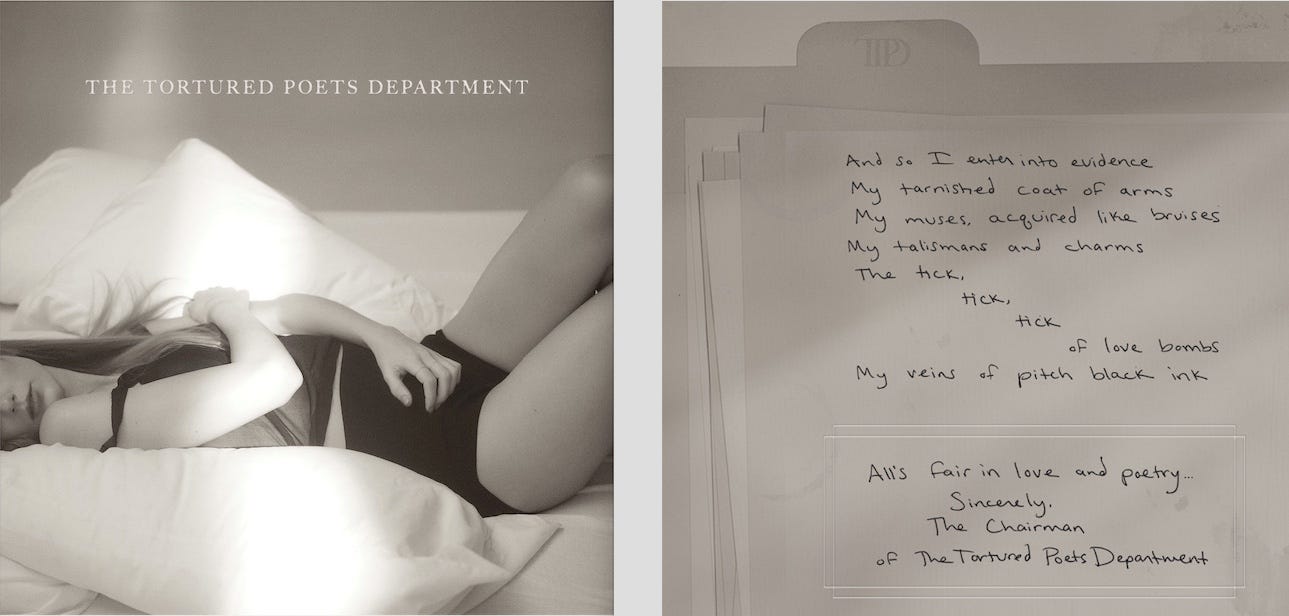The Wrong End of the Pitchfork
Horror from Maggie Dunlap, torture from Taylor Swift. Plus Greek wine and a Super Bowl gambling guide.
There’s a very effective installation up at No Gallery right now by artist Maggie Dunlap—six pitchforks arrayed against and seemingly through one of the space’s walls. Seen one way, the work is a droll play on minimalism with a dash of institutional critique, and the tines are effectively menacing. Dunlap makes good use of what can be a difficult space, turning the hyperexposed jewel-box of a gallery into a giant vitrine. The piece is called The Horseman’s Word VI (2024), after an equine-centric, Freemason-esque secret society in Scotland and England. The other elements in the show likewise walk a line of sculptural bona fides and folk reference in the form of brass-cast rural totems and agricultural talismans—corn-ear bundles for a good harvest and so forth.
But it’s the pitchforks that tap into the power of the horror genre and its core suspicions about the limits of reason, the futility of “progress,” the intractability of the irrational, and the inexplicable lure of slaughter. Horror is the tenor of our age. Horror is the most important category of art of the last twenty years, more important than superhero flicks. Blumhouse is more important than Marvel; The Purge and Saw are more faithful images of the American psyche than the Avengers. The infantile triumphalism of the latter can’t be understood without recourse to the former.
In contemporary art, the fabulist genre of choice is science fiction. It looks to the future, unlike horror, which dwells on the past. Even a story about dystopia implies we can move forward; horror suggests we cannot. Science fiction is escape, horror is reckoning. While of course a genre can be turned inside out and in any number of directions, science fiction essentially embraces the rational. Horror is by contrast a siren song of unreason. Ultimately, art’s relatively small customer base, rich people and institutions, are disinclined to look at, think about, or purchase things that are revolting.
Dunlap’s pitchfork is a potent symbol in its own right, the harvest tool turned into a murder weapon, life flipping in an eyeblink into death. Moreover, it has class overtones. Like horror overall, the pitchfork is populist, be it in the vein of the French Revolution or the stereotype of venal rubes hunting down what they don’t understand.
Dunlap’s work makes an interesting comparison to director Ti West’s Pearl trilogy and its eponymous, pitchfork-wielding protagonist. The two films thus far released, both period pieces, treat lead characters isolated in rustic environments whose desire to escape dead-end subsistence living becomes bound up with the real American dream: becoming a star. The loneliness of it all reminds me of Carson McCullers, and Altman’s Three Women—both of which are tinged with the tenebrous themselves.
West is self-aware, genre-obsessed, gleeful, and smitten—like his characters—with movies. Likewise, Dunlap is self-conscious, even meta. At No, her reification of rural horror tropes seems more or less unto itself, but she’s overall more interested in the mediatization of the horrific, Her recent body of work True Crime, for example, comprises gruesome tableaux of her realistic photos staged like snapshots of seemingly murdered women that Dunlap initially seeded onto forums like 4Chan as if they were real. The work captures a strange, grisly variation on notoriety and how it shapes ideas about death, erotics, and truth.
The Tortured Audience Department
The indefatigable Taylor Swift reinforced her claim to social dominance last weekend by turning a Grammy win for her very mid Midnights into a press conference for a new album drop. Taking exquisite advantage of the Grammys’ scheduling in the down week before the Super Bowl, she has now guaranteed that the announcers at an event watched by upwards of 60% of the US population will mention the upcoming release, likely by its excruciating name. While only her boyfriend is eligible to win the MVP trophy, she’s already had the game’s most impressive performance.
While even I am tired of Swift at this point, there was an interval of twenty-four hours where I nursed the notion that maybe, just maybe the record might not be bad. You may (not) recall speculation that Midnights was a repackaging of a “lost” follow-up to 2017’s Reputation known on the chatboards as Karma—which ended up, of course, being the title of a giddily insidious track on Midnights. That theory would explain why the songwriting and production on Midnights so little resembled that of her masterful pandemic diptych, folklore and evermore. Midnights may have been misbegotten, a back-catalogue clearer, and now we’d be getting something hybrid and new.
My hopes were dashed, however, when the tracklist for The Tortured Poets Society—oops, Department—materialized on Monday night. One shouldn’t judge too much on the basis of titles, and it’s hard to gauge layers of irony at this distance, but the lineup features groaners including “My Boy Only Breaks His Favorite Toys,” the title track, and “The Smallest Man Who Ever Lived,” which is presumably about Scooter Braun. There’s a song with Post Malone, ffs, continuing her tradition of duets with male mediocrities.
What the tracklist reinforces more than anything is the fact that Swift has become obsessed with her dark doppleganger, Lana Del Rey. That song with Post Malone is called “Fortnite,” as if Swift is attempting to manufacture her own “Video Games” with an ersatz bad boy in tow. A one-two punch of songs called “But Daddy I Love Him” and “Fresh Out the Slammer” suggest Lana fanfic. Swift has stolen the cheer captain’s football-player bf but now wants to be queen of the kids smoking cigs in the parking lot. Having conquered the world, she now wants to be cool—which is, of course, the only thing trying hard can’t get you.
Swift’s curious dragooning of Del Rey onstage during the Grammys after besting her in the contest for Album of the Year only confirmed this obsession (speaking of Three Women, there’s a real Pinky Rose thing going on). Swift’s desire to metamorphose contains an anxiety about sex, a desire to be womanly rather than girlish. The strange cover art of My Dark Torturous Poetic Fantasy reads as a Fifty Shades of Grey homage, with Swift’s cutoff face—the cleavage working like a blindfold—as an unexpectedly unpleasant touch. The likeness does give an intriguing twist to the use of the word “tortured,” however, and her bringing BDSM lite back into the media’s attention would be a welcome change from polyamory.
Contrast the cover’s would-be erotics with the image Swift released alongside it, an apparent sheaf from the Poet’s lyrics folder featuring not-her-best verse in childish handwriting. Is she maturing or regressing? What notions does she have about poets, anyway? They are a pretty horny bunch in my experience, but their lounging attire tends to be more in the range of an Asbery-ian silk kimono.
I do fear Swift is due for a screw-up. The release date might be one: the record comes out on April 19, one of the most ominous dates in recent American history, being the anniversary of both the Oklahoma City bombing in 1995 and the Branch Davidian/David Koresh disaster in 1993. April 20 is Hitler’s birthday and the date of the Columbine shooting. I find it literally incomprehensible that someone so attuned to crypto-numerology has chosen a date so ill starred. Maybe wait a week?
Super Bowl Gambling Guide
The LVIIIth Super Bowl is a rematch of the one that took place in Februrary 2020, which is another bad omen, if you’re counting. I honestly have no idea who’s going to win, which is why in terms of gambling I’d recommend avoiding the game itself entirely and instead bet on the running time of the national anthem.
This year, the Star-Spangled honor has devolved to country idol Reba McEntire, with an over/under of a very low 90.5 seconds. As you can see on this handy table from a sketchy website, no one has come in that fast since Kelly Clarkson hit 1:34 in 2012; only two anthems in the history of the game have been shorter than Reba’s projected, Billy Joel with a cool 90 in 2007 and Jewel with a sizzling 87 in 1998. All of which would suggest that over is the obvious bet.
That, of course, is how Vegas gets you—and how you get the sucker at the Super Bowl party who is not a loyal Spigot reader. The number actually started at a jaw-dropping 83.5. The only reason it’s gone up is to even out the money bet on either side of the line. The savvy gambler can readily find YouTube clips of Reba clocking an anthem at 83 seconds at a baseball game in 1997, or, more recently, at about 80 seconds at a charity softball game in 2017—though, given the circumstances, there was no reason for her to draw things out.
Nevertheless, from these examples and this stage of her career, you can assume she’s not going to go for some berserk melismata in the home stretch. Thus at 90.5, I’d take the under, and if the number drifts higher, even better.
Wine
Domaine Zafeirakis Assyrtiko. Fuck winter: I’m still on a bracing white wine kick. The Greek varietal Assyrtiko is like what Sancerre is supposed to be but with even less vegetal Sauvignon taste and more precisely like spring water from an Olympian peak, sweet only in the very particular way that quenching one’s thirst on a hot day is sweet. It’s hard to find a good Assyrtiko in the US (I’ll spare you my golden memories of how I used to buy it in plastic liter bottles from my local Athenian oenoteca), but Domaine Zafeirakis is an excellent organic version, a little smoky and more robust than the norm. You can find it relatively easily at your local natural-wine purveyor and elsewhere.
Music
Let’s hear it for Reba with this classic about getting pimped out by your mom.








